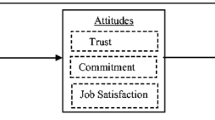Abstract
This study examines sources of influence over 290 faculty members of a large public university. The role expectations a faculty member has for himself and the role expectations of the employing organization both predict positively and significantly the role behaviors of the respondents. The departmental colleagues' expectations predict significantly role behaviors for the research role only. In addition, the degree of person—role conflict a faculty member is exposed to is related to his productivity (research) but not to his satisfaction. The implications of the results are explored for both role theory and for the understanding of faculty behavior.
Similar content being viewed by others
References
Abrahamson, M. (1967). “The professional in the Organization.” Chicago: Rand-McNally.
Anderson, G.L. (1963). The organizational character of American colleges and universities. In: “The Study of Academic Administration” (T.F. Lunsford, ed.). Boulder, Colorado: Western Interstate Commission for Higher Education.
Bem, D.J. (1965). An experimental analysis of self-persuasion. J. Exp. Soc. Psych. 1:199–218.
Bem, D.J. (1966). Inducing belief in false confessions. J. Personality Soc. Psych. 3:707–710.
Bem, D.J. (1967). Self-perception: an alternative interpretation of cognitive dissonance phenomena. Psychol. Rev. 74:183–200.
Biddle, B.J. and Thomas, E.J. (1966). “Role Theory: Concepts and Research.” New York: John Wiley.
Borgatta, E.F. (1961). Role-playing specification, personality and performance. Sociometry 24:218–233.
Bunker, G. (1967). Self-role congruence and status congruence as interacting variables in dyadic behavior. Doctoral dissertation, University of California, Berkeley.
Caplow, T., and McGee, R.J. (1958). “The Academic Marketplace.” New York: Basic Books.
Chaney, F.B. (1966). A cross-cultural study of industrial research performance. J. Appl. Psych. 50:206–210.
Clark, B.R. (1963). Faculty organization and authority. In: “The Study of Academic Administration” (T.F. Lunsford, ed.). Boulder, Colorado: Western Interstate Commission on Higher Education.
Cottrell, L.S., Jr., and Sheldon, E.B. (1966). Relationship expectations. In: “Professionalization” (H.M. Vollmer and D.L. Mills, eds.). Englewood Cliffs, New Jersey: Prentice-Hall.
Crane, D. (1965). Scientists at major and minor universities: a study of productivity and recognition. Amer. Sociol. Rev. 30:699–714.
Dykes, A.R. (1968). “Faculty Participation in Academic Decision Making.” Washington, D.C.: American Council on Education.
Friedlander, F., and Margiules, N. (1969). Multiple impacts of organizational climate and individual value systems upon job satisfaction. Personnel Psych. 22:171–183.
Gouldner, A.W. (1957). Cosmopolitans and locals: toward an analysis of latent social roles, I. Admin. Sci. Quart. 2:281–306.
Gouldner, A.W. (1958). Cosmopolitan and locals: toward an analysis of latent social roles, II. Admin. Sci. Quart. 2:444–480.
Gross, E. (1968). Universities as organizations: a research approach. Amer. Sociol. Rev. 33:518–544.
Gross, N.C., Mason, W.S., and McEachern, A.W. (1958). “Explorations in role analysis: Studies of the School Superintendency.” New York: John Wiley.
Hill, H.W., and French, W.L. (1967). Perceptions of the power of departmental chairmen by professors. Admin. Sci. Quart. 11:548–574.
Katz, D., and Kahn, R.L. (1966). “The Social Psychology of Organizations.” New York: John Wiley.
Korman, A.K. (1971). Expectancies as determinants of performance. J. Appl. Psych. 55:218–222.
Levy, L.H. (1970). “Conceptions of Personality: Theories and Research.” New York: Random House.
Martin, W.B. (1969). “Conformity: Standards and Change in Higher Education.” San Francisco: Jossey-Bass.
Mayeske, G.W. (1970). Teacher Attributes and School Achievement. Do Teachers Make a Difference? Washington, D.C.: U.S. Office of Education.
Mood, A.M. (1971). Partitioning variance in multiple regression analyses as a tool for developing learning models. Amer. Ed. Res. J. 8:191–202.
Mukherjee, B.N. (1968). Achievement values and scientific productivity. J. Appl. Psych. 52:145–147.
Newman, F., et al. (1971). Report on Higher Education. Washington, D.C.: U.S. Government Printing Office.
Parsons, T. (1956). Suggestions for a sociological approach to the theory of organizations, II. Admin. Sci. Quart. 1:225–239.
Pondy, L.R. (1967). Organizational conflict: concepts and models. Admin. Sci. Quart. 12:296–320.
Raven, B.H. (1965). Social influence and power. In: “Current Studies in Social Psychology.” (I.D. Steiner and M. Fishbein, eds.). New York: Holt, Rinehart, and Winston, pp. 371–382.
Sampson, E.E. (1963). Status congruence and cognitive consistency. Sociometry 26:146–152.
Sarbin, T.R., and Allen, V.L. (1969). Role theory. In: “The Handbook of Social Psychology,” vol. I (G. Lindzey and E. Aronson, eds.). Reading, Mass.: Addison-Wesley, pp. 488–567.
Scott, W.R. (1965). Field methods in the study of organizations. In: “Handbook of Organizations” (J.G. March, ed.). Chicago: Rand-McNally.
Smelser, W.T. (1961). Dominance as a factor in achievement and perception in cooperative problem solving interactions. J. Abnormal Soc. Psych. 62:535–542.
Udy, S.H., Jr. (1965). The comparative analysis of organizations. In: “Handbook of Organizations” (J.G. March, ed.). Chicago: Rand-McNally.
Vollmer, H.M., and Mills, D.L. (eds.) (1966). “Professionalization.” Englewood Cliffs, New Jersey: Prentice-Hall.
Wisler, C.E. (1968). On partitioning the explained variance in a regression analysis. Washington, D.C.: U.S. Office of Education, Technical Note No. 2, January.
Author information
Authors and Affiliations
Rights and permissions
About this article
Cite this article
DeVries, D.L. The relationship of role expectations to faculty behavior. Res High Educ 3, 111–129 (1975). https://doi.org/10.1007/BF00991802
Issue Date:
DOI: https://doi.org/10.1007/BF00991802




